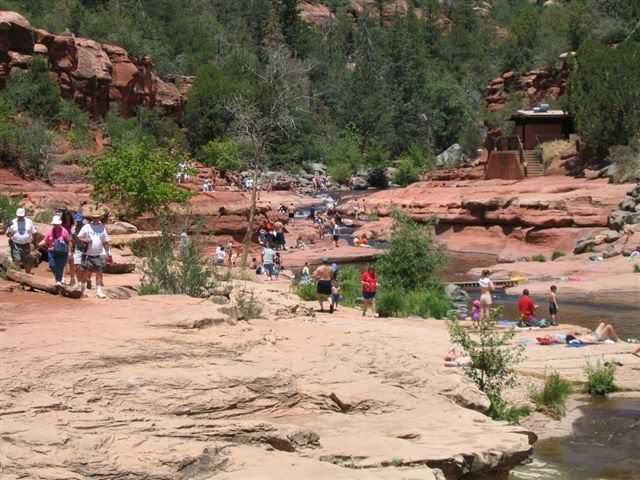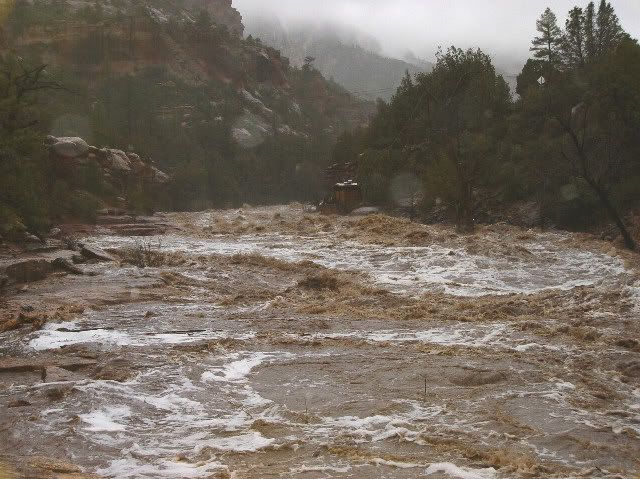Many people have seen the Steve McQueen movie "the Great Escape", about a group of 60 or so prisoners who cleverly dug a tunnel out of a German POW camp and escaped in various directions across Europe, many of whom where eventually recaptured.
I don't know if such an event occurred in Europe, but an almost identical real-life POW escape (tunnel and all) occurred right here in Phoenix, Arizona almost exactly 60 years ago.
Like many isolated western towns in WWII, Phoenix played host to a number of German POW's, in our case about 1700 in Papago Park. Phoenix, and in particular Papago Park, with its arid climate and red rocks, must have been quite a culture shock to the Germans.
Anyway, I won't tell the whole story, but it is fascinating and you can read it all here. A short excerpt:
The German prisoners asked their guards for permission to create a volleyball courtyard. Innocently obliging, the guards provided them with digging tools. From that point on, two men were digging at all times during night hours. A cart was rigged up to travel along tracks to take the dirt out. The men stuffed the dirt in their pants pockets which had holes in the bottoms, and they shuffled the dirt out along the ground as they walked around. In addition, they flushed a huge amount of dirt down the toilets. They labeled their escape route Der Faustball Tunnel (The Volleyball Tunnel).
They dug a 178 foot tunnel with a diameter of 3 feet. The tunnel went 8 to 14 feet beneath the surface, under the two prison camp fences, a drainage ditch and a road. The exit was near a power pole in a clump of brush about 15 feet from the Cross Cut Canal. To disguise their plans, the men built a square box, filled it with dirt and planted native weeds in it for the lid to cover the exit. When the lid was on the tunnel exit, the area looked like undisturbed desert.
There is some dispute about how many people actually escaped -- official records say 25. Others argue that as many as 60 escaped, but since only 25 were recaptured, 25 was used as the official number to cover up the fact that German POW's might be roaming about Arizona.
The prisoners who led this escape were clearly daring and inventive, but unfortunately in Arizona lore they are better known for their one mistake. Coming from wet Northern European climes, the prisoners assumed that the "rivers" marked on their map would actually have flowing water in them. Their map showed what looked like the very substantial Salt River flowing down to the Colorado River and eventual escape in Mexico. Unfortunately, the Salt River most of the year (at least in the Phoenix area) is pretty much a really wide flat body of dirt. The German expressions as they carried their stolen canoes up to its banks must have been priceless.
It never occurred to the Germans that in dry Arizona a blue line marked "river" on a map might be filled with water only occasionally. The three men with the canoe were disappointed to find the Salt River bed merely a mud bog from recent rains. Not to be discouraged, they carried their canoe pieces twenty miles to the confluence with the Gila river, only to find a series of large puddles. They sat on the river bank, put their heads in their hands and cried out their frustration.
I know how they feel every summer when we go to Lake Powell and find the water lower than the previous year. Anyway, we shouldn't just make light of the escapees. Apparently the prison guards made Sargent Schultz look like Sherlock Holmes:
Although the men left in the wee hours of Christmas Eve, the camp officials were blissfully unaware of anything amiss until the escapees began to show up that evening. The first to return was an enlisted man, Herbert Fuchs, who decided he had been cold, wet and hungry long enough by Christmas Eve evening. Thinking about his dry, warm bed and hot meal that the men in the prison camp were enjoying, he decided his attempt at freedom had come to an end. The 22-year old U-boat crewman hitched a ride on East Van Buren Street and asked the driver to take him to the sheriff's office where he surrendered. Much to the surprise of the officers at the camp, the sheriff called and told them he had a prisoner who wanted to return to camp.
One of the last to be re-captured was U-boat Commander Jürgen Wattenberg, the leader of the breakout. Interestingly, Captain Wattenberg hid out in the hills just a few hundred yards from my current home.
UPDATE
One reason I thought of this story, beyond being close to the anniversary, was this story about new Harvard Law professor Jack Goldsmith. Though I am not necesarily a supporter of Mr. Goldsmith's views, the article is a good insight into where campuses are today in terms of academic freedoms. His conservative views and opinions are treated like some hidden scandal that was missed in his hiring and would surely have disqualified him for the position if known. I am sympathetic not because I am conservative, but as a libertarian and defender of free markets, I was thought to be an odd duck on campus as well.
The part of the article that got me thinking about the Great Escape was this:
Before he stepped down from his post as a U.S. assistant attorney general this summer, Goldsmith penned a March draft memo arguing that Central Intelligence Agency officials could transfer Iraqi detainees out of their native country for interrogation without violating the Geneva Convention.
The memo said that detainees would still have to be treated in accordance with international humanitarian norms. But Goldsmith's position has drawn fire from human rights activists and some scholars who argue that the memo marks a dramatic reinterpretation of the 1949 treaty, which safeguards the rights of prisoners of war.
I know nothing about the 1949 treaty, but it seems odd that holding POW's in other countries would be outlawed so soon after we did so much of it ourselves in WWII. Generally, my understanding is that detention of German prisoners in the US went very well for all concerned - in fact, the biggest problem I have ever heard about is that many Germans did not want to leave and be sent back to Germany after the war (see also here). My guess is that such a ban may have resulted from Soviet actions in the later stages of WWII. The Soviets sent many, many German prisoners back east, never ever to return, living out a life of slavery in Siberia and other happy locations long after the war was over. Anyone have any other background on this?



